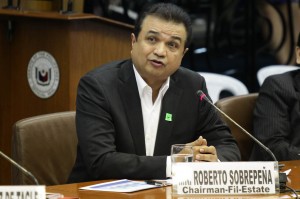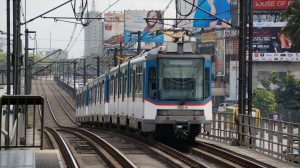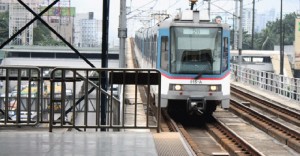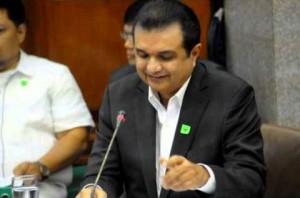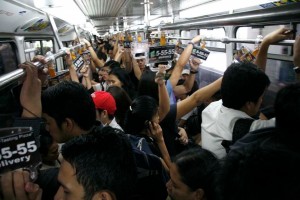By Mick Basa | Rappler.com | December 17, 2014
It turns out that the MRT3 is cheaper than expected. One of its owners says its equities cost less than P20 billion.
MANILA, Philippines – The budget allocated by the government to gain total control of the Metro Rail Transit (MRT) line 3 costs more than half the railway concessionaire’s equity price tag, one of its owners said Wednesday, December 17.
“Definitely it’s not going to be P54 billion ($1.21 billion)*. It’s not going to be P40 billion ($894.75 million). It’s not going to be P20 billion ($447.38 million). It’s going to be much, much less,” Robert John Sobrepeña, chair of the Metro Global Holdings Corporation, told the Senate sub-committee on transportation.
Minus the bonds, which private shareholders valuated to cost over P50 billion ($1.12 billion), Sobrepeña said the government can proceed with purchasing the controlling equities of MRT3’s concessionaire – the Metro Rail Transit Corporation (MRTC).
In 2013, President Benigno Aquino III signed Executive Order (EO) 126 to take over the MRTC. The EO directed the Department of Transportation and Communications (DOTC) and the Department of Finance (DOF) to buy all the shares of stocks and securities issued by MRTC and other entities owning the railway, their rights, and titles, pursuant to the build-lease-transfer contract. The government allotted P56 billion ($1.25 billion) for the takeover.
But the government’s step, according to Sobrepeña, would require it to buy the bonds first before it could even purchase equities.
“Leave the bonds, talk to us,” he said.
Sobrepeña stepped out of MRTC’s board of directors in 2010, but still has a stake in the railway corporation. His company, Metro Global Holdings, is one of the shareholders of the Metro Rail Transit Holdings II, which owns the Metro Rail Transit Corporation (MRTC) – the MRT3 concessionaire.
Compromise
Apart from the bargain, Sobrepeña said they are also willing to drop their arbitration case against the Philippine government which they filed in Singapore in 2009. As a compromise, they propose that they take over the operations maintenance of the MRT3 – with revenues sourced from passenger fare payments which will see an adjustment not higher than the prevailing bus fare rates, he said.
The government was being sued for its late payment of equity rentals.
To seal the deal, Sobrepeña said government would only need to initiate talks with the private shareholders of the MRT3’s concessionaire. (READ: MRT3 owners open to a buyout)
But talks have not transpired.
In several interviews and Senate inquiries, Transportation Secretary Joseph Emilio Abaya said talking with the private shareholders is not necessary since majority of MRTC’s board of directors represent the government.
For instance, MRTC’s current chairman and president, Tomas de Leon Jr, is also director at the state-owned Land Bank of the Philippines.
Since 2009, LBP and DBP have been holding a combined 80% economic interest in the MRTC, but without voting rights, which are needed in making decisions within a corporation’s operations. The bonds, though, paved the way for government to hold 4 out of 14 seats at the MRTC’s board of directors, Sobrepeña said.
Private shareholders of the MRT3 and Transportation officials have been grilled 3 times at the Senate beginning in October, following a train accident in August.
Both have been criticized for passing the blame from one to another on who must be held responsible for the recurring glitches at the 17-kilometer railway system.
Senator Grace Poe, who chairs the Senate transportation sub-committee, requested DOTC to discuss with the MRTC the proposals of Sobrepeña.
“Before the government spends on something, we have to be sure that it is the best option – that we are not wasting the money of the people,” she said.
Also on Wednesday, the Senate approved the supplemental budget for the MRT3 rehabilitation worth P1,207,163,000 ($26,957,170.88). – Rappler.com

